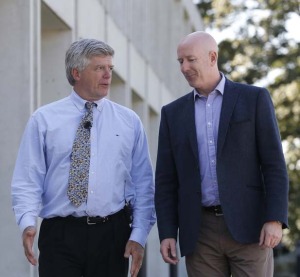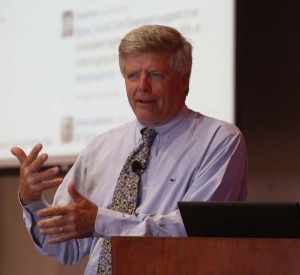
This is the second in my two-part interview with Dr. Tom Davenport, analytics thought leader and author of Big Data @ Work. We caught up in Dublin to talk data science model management and the skills gap. Previously, we discussed big data and the Internet of Things in part one of this interview.
John Farrelly: Data science is obviously very important to us here at SAS, but how did you get interested in the topic?
Tom Davenport: Well, I was talking to my friends and people at SAS in Cary, North Carolina about the whole big data thing. I suggested that I conduct a study into data scientists, what do they do, how do they spend their time, how are they different from other people? Initially, I planned just to go to Silicon Valley and interview a load of them. But then Jill Dyche from SAS suggested to me that it might be more interesting to talk to a different set of companies, and SAS would help me out with that.
John: Yes, that does sound interesting. What sort of things did you discover?
Tom: I found that the organizations I spoke to are now taking analytics to a higher level, you might say that they are "industrializing" or "operationalizing" it.
John: Sort of a model factory? But were they integrating the output of these models into their businesses?
Tom: Yes, for example Cisco has 30,000 marketing propensity models. Obviously, you can't create that many models in the traditional way, so many models are now created by machine learning algorithms. Of course, as we saw with the financial services industry, there's a risk in having that many models running without some sort of management process. The financial services companies have to enact strict model management processes or else they'll have to answer to the financial regulators.
John: So, how are managers, particularly outside of financial services, coping with this?

Tom: To be honest, most managers don't have a clue how this stuff works. And now that a lot of decisions are becoming automated or semi-automated, they're asking questions. "How do we know when the models aren't working, what are the underlying assumptions, is the world changing and are our models changing with it?"
A lot of managers are now asking if they should take some courses in analytics and machine learning to get some idea of when and whether they should intervene. To be fair some of the traditional quants have become proficient with communicating with senior managers and telling stories with data, but the machine learning people are still pretty bad at it, and if things don't change we could be in big trouble.
John: Yes, organisations need to consider how they can move their analytics out of the "dark room" so to speak. How do they integrate analytics into their decision-making processes and how are those decisions taken out into the wider business?
Tom: Well, the other interesting issue, I think, is how analytics is leading to products based upon data.
John: You mean monetization?
Tom: Yes, monetization. Monsanto and GE are already monetizing their data, for example, by helping farmers to optimize their crop yields. But companies such as Barclays, JP Morgan Chase and Singtel are working in this area too. Verizon in the US are able to tell their where their customers were before watching a basketball game and where they went afterwards. That opens up opportunities for joint promotions and the like.
John: But what happens if these companies get it wrong and provide inaccurate recommendations?
Tom: Yes, and are they then liable? Good news for the lawyers perhaps?
John: Its always good news for lawyers, lawyers and accountants.
Tom: It is, and they always do pretty well. You have to come to an agreement with your customers that lets them use your data, but doesn't make you too liable if it all goes horribly wrong!
John: To finish up, I'd like to talk to you about the issue of analytical skills. Customer analytics has been a huge driver for organizations and we've seen a lot of capability building up in marketing departments and then proliferating across the organization, with Chief Information Officers (CIOs) taking control, sometimes even Chief Data Officers. So it would be interesting to hear how companies are dealing with the skills gap in this area? Is a new generation of data scientists coming out of the universities?
Tom: Organizationally, its not really been sorted out yet; we now have Chief Analytics Officers (CAO) and Chief Data Officers (CDO) as well as more traditional roles such as Chief Marketing Officers and Chief Technology Officers. Who's really in control? For example, at Wells Fargo the new Chief Data Officer was also responsible for analytics. Having a CAO and a CDO would just end up with unhelpful competition.
John: Fair, organizations are taking different approaches but I think they do now understand that data is an asset, and someone needs to own that asset.
Tom: Data issues are getting more air time in board rooms. There was a time when board members were asking what does this big data thing mean to us and what do we do with it? They are now asking, how can we make money out of it?
However, the term big data is starting to fall out of fashion, people are looking for the next big thing, its some sort of combination of the Internet of Things and data monetization.
Getting back to your question about skills, the good news is that the universities are starting to turn out bodies who really understand this stuff. Initially, only PhDs were thought up to the job of data science, but now masters students and even undergraduates are being considered.
John: Undergrads, interesting.
Tom: It will be fascinating to see what combinations of skills and levels will really pay off. The early data scientists were all PhDs or very smart college drop-outs like Bill Gates. Interestingly, the most important attribute seems to be the ability to communicate clearly; however, many of the American universities (North Carolina State being a clear exception) are still locked into thinking that data science is all about methodologies and tools and that communication is just too soft and fluffy to be worthwhile.
John: How about from the business side, how are the managers being educated?
Tom: Historically, not very well; students just weren't interested in analytics. Partly because it was taught so badly at school. You can get through an entire MBA programme without understanding what a regression equation is. However, some schools are considering bringing it back in.
John: Thanks Tom, that's all we have time for now, but it's been great speaking to you.
Tom: Thanks, I enjoyed it.
Interested in getting to know Hadoop? Register for a free, 30-minute Webinar.
This is the second part of the enjoyable and enriching interview I had with Tom. Read part one here. Thanks to my colleague Philip Male supporting me with this article. Folllow Phil on Twitter, @PhilMale.

